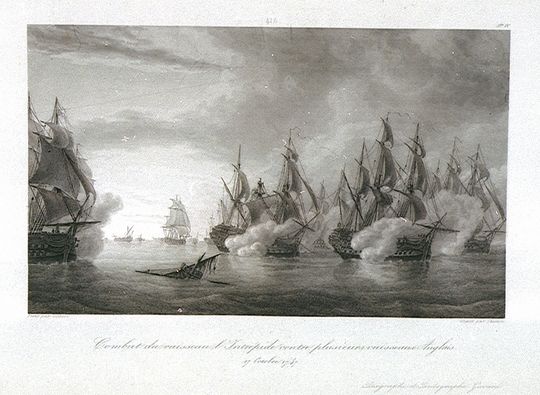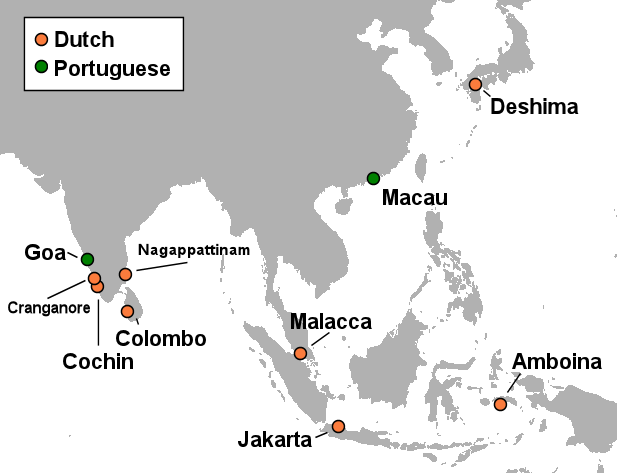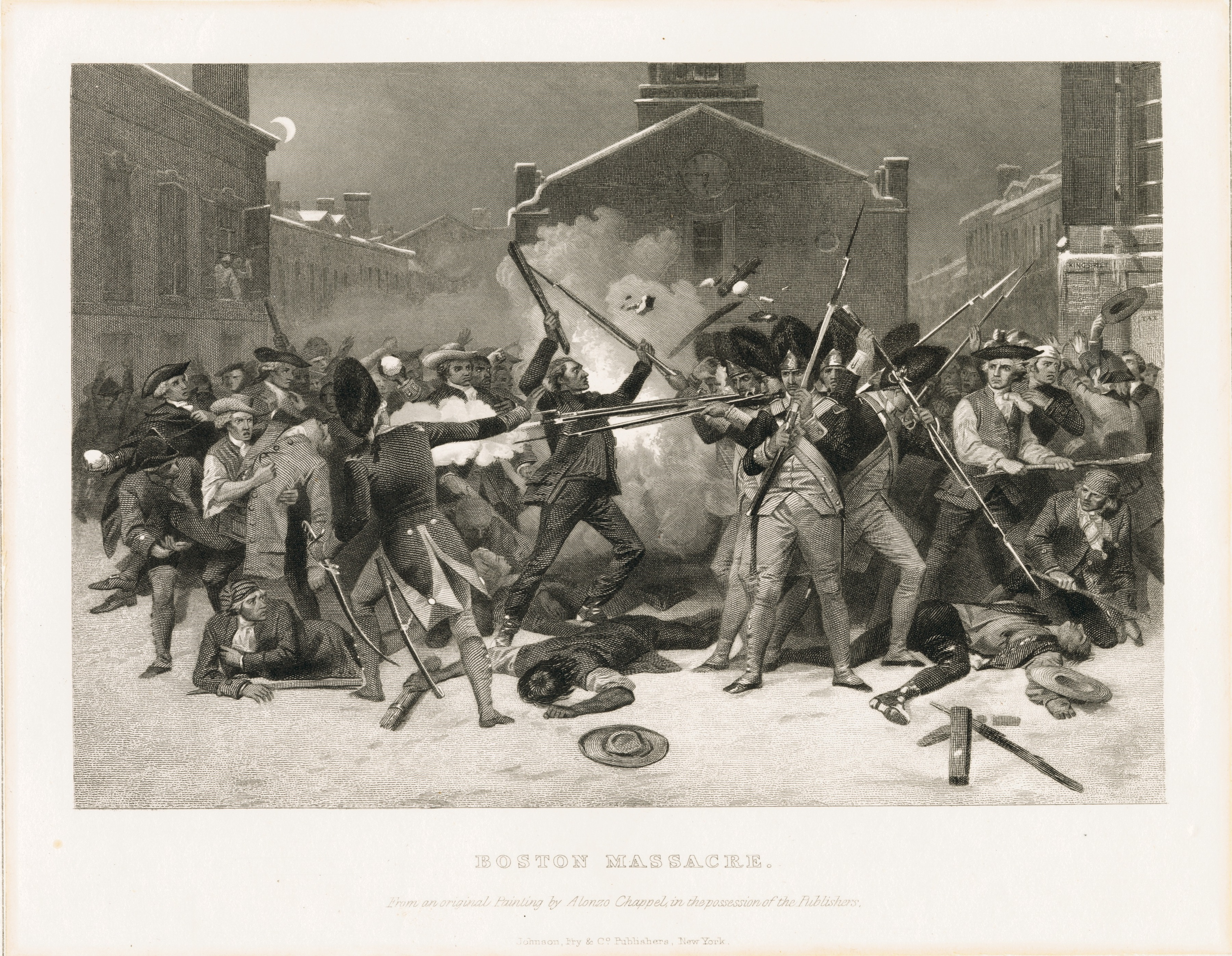|
Fourth Anglo-Dutch War
The Fourth Anglo-Dutch War (; 1780–1784) was a conflict between the Kingdom of Great Britain and the Dutch Republic. The war, contemporary with the American Revolutionary War (1775–1783), broke out over British and Dutch disagreements on the legality and conduct of Dutch trade with Britain's enemies in that war. Although the Dutch Republic did not enter into a formal alliance with the rebelling American colonies and their allies, American ambassador (and future president) John Adams managed to establish diplomatic relations with the Dutch Republic, making it the second European country to diplomatically recognise the Continental Congress in April 1782. In October 1782, a treaty of amity and commerce was concluded as well. Most of the war consisted of a series of British operations against Dutch colonial economic interests, although British and Dutch naval forces also met once off the Dutch coast. The war ended disastrously for the Dutch and exposed the weakness of the po ... [...More Info...] [...Related Items...] OR: [Wikipedia] [Google] [Baidu] |
American Revolutionary War
The American Revolutionary War (April 19, 1775 – September 3, 1783), also known as the Revolutionary War or American War of Independence, was the armed conflict that comprised the final eight years of the broader American Revolution, in which American Patriot (American Revolution), Patriot forces organized as the Continental Army and commanded by George Washington defeated the British Army during the American Revolutionary War, British Army. The conflict was fought in North America, the Caribbean, and the Atlantic Ocean. The war's outcome seemed uncertain for most of the war. However, Washington and the Continental Army's decisive victory in the Siege of Yorktown in 1781 led King George III and the Kingdom of Great Britain to negotiate an end to the war in the Treaty of Paris (1783), Treaty of Paris two years later, in 1783, in which the British monarchy acknowledged the independence of the Thirteen Colonies, leading to the establishment of the United States as an independent and ... [...More Info...] [...Related Items...] OR: [Wikipedia] [Google] [Baidu] |
George Brydges Rodney, 1st Baron Rodney
Admiral George Brydges Rodney, 1st Baron Rodney, KB ( bap. 13 February 1718 – 24 May 1792), was a Royal Navy officer, politician and colonial administrator. He is best known for his commands in the American War of Independence, particularly his victory over the French at the Battle of the Saintes in 1782. It is often claimed that he was the commander to have pioneered the tactic of breaking the line. Rodney came from a distinguished but poor background, and went to sea at the age of fourteen. His first major action was the Second Battle of Cape Finisterre in 1747. He made a large amount of prize money during the 1740s, allowing him to purchase a large country estate and a seat in the House of Commons of Great Britain. During the Seven Years' War, Rodney was involved in a number of amphibious operations such as the raids on Rochefort and Le Havre and the Siege of Louisbourg. He became well known for his role in the capture of Martinique in 1762. Following the Peace of ... [...More Info...] [...Related Items...] OR: [Wikipedia] [Google] [Baidu] |
Commercial Power
Economic power refers to the ability of countries, businesses or individuals to make decisions on their own that benefit them. Scholars of international relations also refer to the economic power of a country as a factor influencing its power in international relations. Definition Economists use several concepts featuring the word power: * Market power is the ability of a firm to profitably raise the market price of a good or service over marginal cost. ** Monopoly power is a strong form of market power—the ability to set prices or wages unilaterally. This is the opposite of the situation in a perfectly competitive market in which supply and demand set prices. * Purchasing power, i.e. the ability of any amount of money to buy goods and services. Those with more assets, or more correctly net worth, have more power of this sort. The greater the liquidity of one's assets, the greater one's purchasing power is. Purchasing power parity is a way of adjusting exchange r ... [...More Info...] [...Related Items...] OR: [Wikipedia] [Google] [Baidu] |
Dutch Empire
The Dutch colonial empire () comprised overseas territories and trading posts under some form of Dutch control from the early 17th to late 20th centuries, including those initially administered by Dutch chartered companies—primarily the Dutch East India Company (1602–1799) and Dutch West India Company (1621–1792)—and subsequently governed by the Dutch Republic (1581–1795) and modern Kingdom of the Netherlands (1815–1975). Following the ''de facto'' independence of the Dutch Republic from the Spanish Empire in the late 16th century, various trading companies known as '' voorcompagnie'' led maritime expeditions overseas in search of commercial opportunities. By 1600, Dutch traders and mariners had penetrated the lucrative Asian spice trade but lacked the capital or manpower to secure or expand their ventures; this prompted the States General in 1602 to consolidate several trading enterprises into the semi-state-owned Dutch East India Company (, VOC), which was g ... [...More Info...] [...Related Items...] OR: [Wikipedia] [Google] [Baidu] |
Battle Of Dogger Bank (1781)
The Battle of Dogger Bank was a naval battle that took place on 5 August 1781 during the Fourth Anglo-Dutch War, contemporaneously related to the American Revolutionary War, in the North Sea. It was a bloody encounter between a British squadron under Vice Admiral Sir Hyde Parker and a Dutch squadron under Vice Admiral Johan Zoutman, both of which were escorting convoys. Background In December 1780, Great Britain declared war on the Dutch Republic, drawing it militarily into the American War of Independence. The Dutch had for several years been supplying the Americans and shipping French supplies to the Americans in support of the American war effort, the reason behind the British declaration of war. The opening of hostilities with the Dutch meant that Britain's trade with countries on the Baltic Sea—where key supplies of lumber for naval construction were purchased—was potentially at risk, and that the British had to increase protection of their shipping in the ... [...More Info...] [...Related Items...] OR: [Wikipedia] [Google] [Baidu] |
Continental Congress
The Continental Congress was a series of legislature, legislative bodies, with some executive function, for the Thirteen Colonies of British America, Great Britain in North America, and the newly declared United States before, during, and after the American Revolutionary War. The Continental Congress refers to both the First Continental Congress, First and Second Continental Congress, Second Congresses of 1774–1781 and at the time, also described the Congress of the Confederation of 1781–1789. The Confederation Congress operated as the first federal government until being replaced following ratification of the Constitution of the United States, U.S. Constitution. Until 1785, the Congress met predominantly at what is today Independence Hall in Philadelphia, though it was relocated temporarily on several occasions during the Revolutionary War and the Philadelphia campaign, fall of Philadelphia. The First Continental Congress convened in Philadelphia in 1774 in response to esc ... [...More Info...] [...Related Items...] OR: [Wikipedia] [Google] [Baidu] |
John Adams
John Adams (October 30, 1735 – July 4, 1826) was a Founding Fathers of the United States, Founding Father and the second president of the United States from 1797 to 1801. Before Presidency of John Adams, his presidency, he was a leader of the American Revolution that achieved independence from Kingdom of Great Britain, Great Britain. During the latter part of the American Revolutionary War, Revolutionary War and in the early years of the new nation, he served the Federal government of the United States, U.S. government as a senior diplomat in Europe. Adams was the first person to hold the office of vice president of the United States, serving from 1789 to 1797. He was a dedicated diarist and regularly corresponded with important contemporaries, including his wife and adviser Abigail Adams and his friend and political rival Thomas Jefferson. A lawyer and political activist prior to the Revolution, Adams was devoted to the right to counsel and presumption of innocence. He de ... [...More Info...] [...Related Items...] OR: [Wikipedia] [Google] [Baidu] |
President Of The United States
The president of the United States (POTUS) is the head of state and head of government of the United States. The president directs the Federal government of the United States#Executive branch, executive branch of the Federal government of the United States, federal government and is the Powers of the president of the United States#Commander-in-chief, commander-in-chief of the United States Armed Forces. The power of the presidency has grown since the first president, George Washington, took office in 1789. While presidential power has ebbed and flowed over time, the presidency has played an increasing role in American political life since the beginning of the 20th century, carrying over into the 21st century with some expansions during the presidencies of Presidency of Franklin D. Roosevelt, Franklin D. Roosevelt and Presidency of George W. Bush, George W. Bush. In modern times, the president is one of the world's most powerful political figures and the leader of the world's ... [...More Info...] [...Related Items...] OR: [Wikipedia] [Google] [Baidu] |
History Of The United States (1776–1789)
The history of the United States from 1776 to 1789 was marked by the nation's transition from the American Revolutionary War to the establishment of a novel constitutional order. As a result of the American Revolution, the thirteen British colonies emerged as a newly independent nation, the United States of America, between 1776 and 1789. Fighting in the American Revolutionary War started between colonial militias and the British Army in 1775. The Second Continental Congress issued the Declaration of Independence on July 4, 1776. The Articles of Confederation were ratified in 1781 to form the Congress of the Confederation. Under the leadership of General George Washington, the Continental Army and Navy defeated the British military, securing the independence of the Thirteen Colonies. The Confederation period continued until 1789, when the states replaced the Articles of Confederation with the Constitution of the United States, which remains the fundamental governing law of the ... [...More Info...] [...Related Items...] OR: [Wikipedia] [Google] [Baidu] |
Pierre André De Suffren
Pierre is a masculine given name. It is a French form of the name Peter. Pierre originally meant "rock" or "stone" in French (derived from the Greek word πέτρος (''petros'') meaning "stone, rock", via Latin "petra"). It is a translation of Aramaic כיפא (''Kefa),'' the nickname Jesus gave to apostle Simon Bar-Jona, referred in English as Saint Peter. Pierre is also found as a surname. People with the given name * Monsieur Pierre, Pierre Jean Philippe Zurcher-Margolle (c. 1890–1963), French ballroom dancer and dance teacher * Pierre (footballer), Lucas Pierre Santos Oliveira (born 1982), Brazilian footballer * Pierre, Baron of Beauvau (c. 1380–1453) * Pierre, Duke of Penthièvre (1845–1919) * Pierre, marquis de Fayet (died 1737), French naval commander and Governor General of Saint-Domingue * Prince Pierre, Duke of Valentinois (1895–1964), father of Rainier III of Monaco * Pierre Affre (1590–1669), French sculptor * Pierre Agostini, French physicist ... [...More Info...] [...Related Items...] OR: [Wikipedia] [Google] [Baidu] |
Iman Willem Falck
Iman Willem Falck (25 March 1736 – 6 February 1785) was a Dutch colonial governor who served as the 32nd Governor of Zeylan during the Dutch period in Ceylon. He was appointed on 7 August 1765 and was Governor until 5 February 1785. He was succeeded by Edward Hughes. Biography He was the son of Frans Willem Falck, of Cologne, and Adriana Gobius, of Samarang Semarang ( Javanese: , ''Kutha Semarang'') is the capital and largest city of Central Java province in Indonesia. It was a major port during the Dutch colonial era, and is still an important regional center and port today. The city has been na .... He married Theodora Rudolpha de Wendt in 1763. Shortly after taking office as governor, after a quarter century of hostilities, a treaty was made with the king of Kandy, Kirti Sri Rajasinha, on February 14, 1766 in Colombo . The entire coastal area and cinnamon all districts remained in the hands of the East India Company, while Kandy was not to collude with other power ... [...More Info...] [...Related Items...] OR: [Wikipedia] [Google] [Baidu] |
Jan Hendrik Van Kinsbergen
Jan Hendrik van Kinsbergen, Count of Doggerbank (1 May 1735 – 24 May 1819), was a Dutch naval officer. Having had a good scientific education, Van Kinsbergen was a proponent of fleet modernization and wrote many books about naval organization, discipline and tactics. In 1773, he twice defeated an Ottoman fleet while in Russian service. Returning to the Dutch Republic in 1775, he became a Dutch naval hero in 1781, fighting the Royal Navy, and gradually attained the position of commander-in-chief as a lieutenant-admiral. When France conquered the Republic in 1795 he was fired by the new revolutionary regime and prevented from becoming Danish commander-in-chief, but the Kingdom of Holland reinstated him in 1806, in the rank of fleet marshal, and made him a count. He was again degraded by the French Empire in 1810; after the liberation the United Kingdom of the Netherlands in 1814 honoured him with his old rank of lieutenant-admiral. Van Kinsbergen, in his later life a very we ... [...More Info...] [...Related Items...] OR: [Wikipedia] [Google] [Baidu] |









